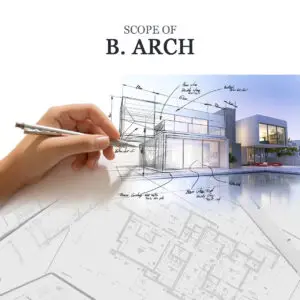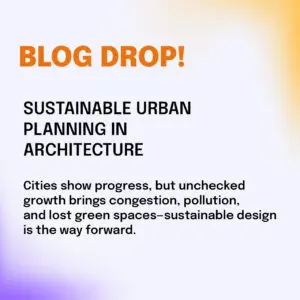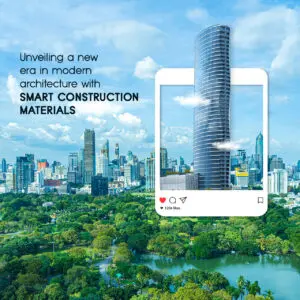
Climate change, rapid urbanisation and resource depletion are serious issues that pose serious threats to modern space planning and evolving infrastructure. Architecture at the intersection of creativity and functionality is crucial in shaping a sustainable future.
A course like B. Arch in Sustainable Design equips students with the knowledge and skills to create buildings and spaces that are energy-efficient, environmentally conscious, and socially responsive. This blog explores the evolving landscape of sustainable architecture and the diverse career pathways it opens up for future-ready architects.
The Growing Relevance of Sustainable Architecture in India and Beyond
In India, where buildings account for nearly 40% of total energy consumption, sustainability in architecture is no longer optional; it is essential. Precisely why a B. Arch in sustainable design brings innovative construction planning ideas with the sensible use of building materials.
Government initiatives like Smart Cities Mission, Energy Conservation Building Code (ECBC), and GRIHA (Green Rating for Integrated Habitat Assessment) are pushing for greener, energy-efficient structures across public and private sectors.
Internationally, LEED (Leadership in Energy and Environmental Design) certifications are becoming standard benchmarks for eco-friendly construction. Cities like Pune, Surat, and Indore are embracing smart, sustainable infrastructure, while globally, projects such as Singapore’s Punggol Eco-Town and Germany’s Vauban district offer blueprints for carbon-neutral living.
Core Skills and Technologies Shaping Careers after B. Arch in Sustainable Designs
A successful career in sustainable architecture requires a solid foundation in ecological sensitivity and technological proficiency.
Students must first understand passive design principles – strategies that optimise natural ventilation, daylighting, and thermal comfort to reduce a building’s energy demands. Equally important is integrating renewable energy systems like solar panels, wind turbines, and geothermal heating into architectural plans.
Familiarity with sustainable and low-impact materials, including recycled, local, and rapidly renewable resources, is vital for reducing a building’s carbon footprint. On the technical side, mastering digital tools is crucial.
Building Information Modelling (BIM) enables architects to design, simulate, and manage projects more efficiently while tracking energy use and material quantities.
Tools such as EnergyPlus, DesignBuilder, and IES VE are all part of our B. Arch in sustainable design, aspects that allow students to conduct energy simulations and evaluate building performance before construction even begins.
Moreover, understanding Life Cycle Assessment (LCA) helps architects make informed decisions about materials and construction methods by evaluating the environmental impact over a building’s lifespan.
Career Avenues and Higher Education Opportunities in Sustainable Design
B. Arch in Sustainable Design opens doors to many impactful and future-forward career paths. Graduates can pursue roles such as Green Building Consultant, where they help clients design structures that meet sustainability certifications like LEED, GRIHA, or WELL.
Others may become Environmental Planners, working closely with governments and private developers to create ecologically balanced land-use plans. The role of an Urban Sustainability Specialist is gaining traction in smart city projects, focusing on integrating green mobility, efficient resource management, and climate-resilient infrastructure. Opportunities also exist in energy auditing, sustainable materials research, and environmental impact assessment consulting.
For students looking to deepen their expertise, numerous postgraduate programs are available both in India and abroad. In India, institutes like CEPT University, NID Ahmedabad, and TERI School of Advanced Studies offer specialised master’s degrees in Sustainable Architecture, Urban Ecology, or Environmental Planning. Internationally, universities such as the University of California, Berkeley, TU Delft (Netherlands), and the University of Melbourne offer world-renowned Sustainable Design, Environmental Architecture, and Green Urbanism programs.
Additionally, industry-recognised certifications such as LEED Accreditation, EDGE Expert Certification, and GRIHA Evaluator Training can boost employability and expand global career prospects. With sustainability at the core of global development, students specialising in this field are well-positioned to shape a greener, brighter future.
OmDayal Group of Institutions: Building Fresh Minds to Shape Skylines of Future
At OmDayal Group of Institutions, we believe sustainable design is not just a subject but a responsibility. Our B. Arch in sustainable design program is rooted in innovation, environmental consciousness, and practical learning, equipping students to become architects who design buildings and shape a better, greener future.
By nurturing fresh minds with a forward-thinking curriculum, hands-on experience, and exposure to global best practices, we empower the next generation to lead the way in sustainable architecture and urban transformation. The future of our skylines starts here.
Reference:
- https://www.sunconengineers.com/green-architecture-company-in-india/#
- https://www.cmr.edu.in/blog/the-importance-of-sustainable-design-in-bachelor-of-architecture-programs/#
- https://www.breathe.com.au/guides/houses/principles-of-sustainable-architecture#
- https://dsca.edu.in/sustainable-design-practices-in-architecture-learning-from-the-best-at-dsca/




